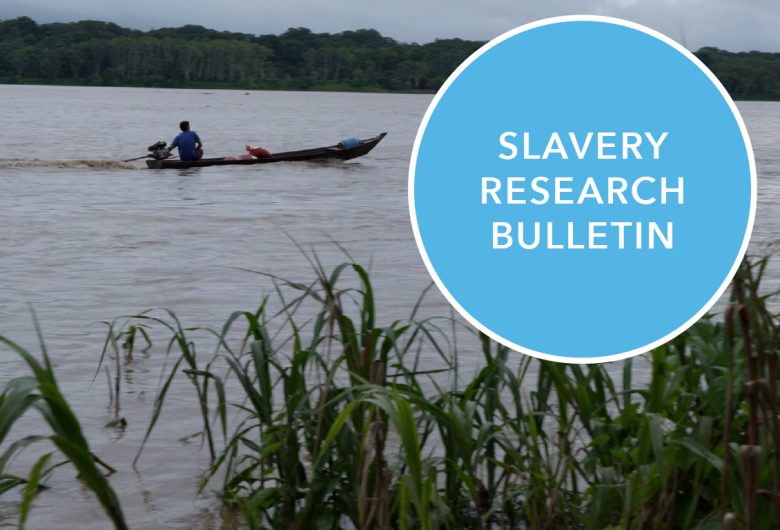Welcome to the Freedom Fund’s monthly bulletin designed to bring you new and compelling research from the global anti-slavery movement.
Cattle-driven deforestation links to forced labour and invasions of indigenous lands in Brazil
Climate Rights International examines the link between deforestation, labour abuses and invasion of Indigenous lands in the Brazilian cattle sector, as well as the supply chains of global fashion and footwear brands. Drawing on accounts from more than 50 interviews, the findings reveal the growth of beef exports, with revenue rising from US $6.7 billion in 2013 to US $10.6 billion in 2023; a significant source of revenue from leather export; and the rancher-led invasions of more than 120,000 square kilometres of Indigenous lands across Brazil. The report highlights patterns of worker mistreatment during ranch establishment, including isolation, debt bondage and being kept under armed watch. The report signals the need for major slaughterhouses and meatpackers as well as the government to monitor cattle supply chains.
Local organisations play key roles in supporting survivors in conflict-affected Myanmar
The Freedom Fund offers insights on how local organisations are overcoming barriers to continue delivering essential services for survivors in Myanmar. Drawing on the experience of local organisations assisting women and girls at risk of trafficking for forced marriage and exploitation, the report outlines strategies deployed by frontline organisations, including the training of community volunteers, survivor engagement, hotline operation, referral network building and providing behind-the-scenes support for survivors seeking justice. The report details effective supports for survivors in a crisis setting and calls for flexible, long-term funding for frontline organisations adapting in constrained environments.
Child labour persists in extraction of European Union (EU)-designated critical minerals
Terre des Hommes Netherlands reports on the risk of child labour in the extraction of 34 EU-designated critical minerals. Using publicly available export data, the study identifies minerals with a high risk of child labour (cobalt, graphite, nickel, aluminium, copper and rare earth elements) and high-risk exporting countries (the Democratic Republic of the Congo, Mozambique, India, the Philippines, Indonesia and Myanmar). The findings show that mining pollution negatively impacts at least a quarter of the labour force in the identified countries. The study highlights a risk of child labour and sex trafficking occurring at all the extraction sites and makes clear recommendations including further research.
The true economic cost and prevalence of modern slavery in UK
Unseen UK estimates the economic costs that modern slavery imposes on UK police forces and society. Using 2024 Home Office data, the report uncovers an annual socio-economic burden in the UK ranging from £52 billion to £60 billion, and a low recovery of proceeds of crime (just 0.4% of the total cost of law enforcement) due to reduced access to financial investigators as well as poor engagement with survivors. Even though there has been a 141% increase in policing costs since 2018, the increases in policing costs across regions are not directly linked to the number of survivors identified. The report underscores the importance of acknowledging the true costs and investing in comprehensive approaches.
Flawed digital financial systems expose Kenya’s smallholder tea farmers to exploitation
The University of Birmingham explores how digital lenders shape exploitation, conceal abuses and challenge accountability in Kenya’s smallholder tea sector. Eighty-three interviews with farmers and employees revealed automation of flat-rate loan deductions, manipulation of digitised weighing systems at tea collection centres, and the lack of formal grievance mechanisms when financial errors or exploitative practices occur. The findings demonstrate that in Kenya’s commercial small-scale tea sector, modern technology lacking inclusive design, participatory governance and effective regulation becomes a conduit for exploitation.
The prevalence of commercial sexual exploitation among female minors in Brazil
Researchers from the Oswaldo Cruz Foundation, University of Ceará, and the Freedom Fund estimate the population size of girls under 18 years of age involved in commercial sexual exploitation of children (CSEC) in the Recife Metropolitan Area of Brazil. Median population size estimates across two methodologies were 19,472 and 36,165 girls who have engaged in CSEC at least once. The study also identifies the forms of violence perpetrated against survivors and highlights key prevention pathways. To obtain a full text copy of the study, please contact the corresponding author.
Read on
The Journal of Human Trafficking publishes a special issue on the Validation of prevalence estimation research methods in human trafficking, including a discussion on the lessons learnt from the Prevalence Research Innovation Forum.
Millikin University examines human trafficking in Ukraine and reveals that Ukraine’s strong prevention efforts before the war helped ease the pressure during the different stages of the war.
Anti-Trafficking Review offers insights from workers and communities in the Brazilian Amazon opposing deforestation and slave labour.
A study by the University of Manchester analyses the role and limitations of digital technology in addressing modern slavery in garment supply networks.
Freedom Fund news
We are honoured to announce that MacKenzie Scott has made a generous second transformative gift to the Freedom Fund. This gift is a powerful endorsement of our mission to drive a measurable reduction of modern slavery. Read the announcement.
Visit our Newsroom for more updates.
Research library
Visit our Slavery Research Library to access anti-slavery resources from across the globe.
Contact
Our team would love to hear from you. Email us at [email protected].
The Slavery Research Bulletin is produced monthly by the Freedom Fund, a global fund with the sole aim of helping end modern slavery.
Research being featured in this bulletin does not equal endorsement by the Freedom Fund.
Join the Slavery Research Bulletin mailing list.
Photo credit: Filmatory Nepal/The Freedom Fund



